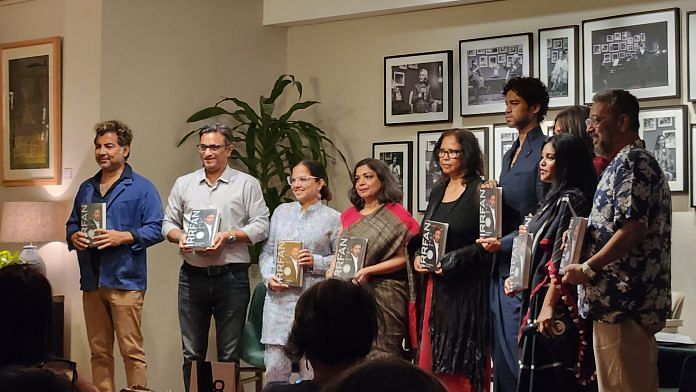Mumbai: Irrfan Khan read through the script of the Netflix film—Radhika Apte and Nawazuddin Siddiqui-starrer Raat Akeli Hai—and didn’t like it. This was revealed by his wife Sutapa Sikdar at a recent launch of a new biography called Irrfan: A Life In Movies.
“Eventually, he did not do the film because he was unwell. However, I quite liked the script. It was an out-and-out crime story written by a female writer. When I asked him what it is that he did not like about it, he would say the core of the script is fine but in some parts, the film is boring,” she said at the launch of the book written by film critic Shubhra Gupta in Mumbai.
Sikdar said that for Irrfan, it was the “niyat” (intent) behind every script that he chose. “Although he was not a practising Muslim, one word from Islam he strongly followed was niyat. What is the niyat behind storytelling,” she said, adding that the actor didn’t just want his part but the overall script to be good.
The launch of Gupta’s book, Irrfan: A Life In Movies, was a reunion of sorts of Khan’s family—his wife and son Babil, writer and producer Shailaja Kejriwal, and actor and poet Danish Hussain—in Mumbai’s private members’ club called The Quorum.
Also read: Irrfan was no prisoner to image. He singlehandedly lifted the status of ‘character actors’
Sutapa and Irrfan
Sikdar was relieved that Shubhra Gupta did not delve much into the details of Khan’s life and focused on his acting journey.
She did, however, share that she is keen on writing a funny book about Irrfan Khan who is regarded as a “serious” person largely because of the roles he did. “People take him as very intimidating but he was not in real life. He was a simple middle class man, he didn’t have any attitude, or think that he needed to be 10 minutes late, or that he would not go around with bodyguards. I want to write about how he dealt with his last days when he was undergoing the treatment,” said Sikdar, who has written dialogues for films such as Khamoshi: The Musical (1996), Shabd (2005), and Kahaani (2012). She later turned producer with Madaari (2016) and Qarib Qarib Singlle (2017), both starring Irrfan in the lead.
In the conversation that lasted an hour, Sikdar opened up about her first meeting with Irrfan at the National School of Drama (NSD). He assumed her to be a senior and asked for directions to a particular class. Sikdar recalled that she took “advantage” of it and sent him in a different direction.
“Later, he saw me writing the second exam. He was so angry because honesty to him was very important. For me, it was a frivolous thing, like taking panga. But for him, it was more about dishonesty. He told me, ‘Tum to third year ki ho hi nahi (You are not from the third year)’. So I replied, ‘I didn’t say anything, you only believed I am in the third year’.”
Not much is known about Sutapa Sikdar and Irrfan Khan’s love story in the industry. They tied the knot in 1995 and have two sons. While both Sutapa and Irrfan came from NSD, they held different perspectives about what the institute meant to them.
“I was born and brought up in Delhi. We studied at NSD, which is also in Delhi. Irrfan was from Jaipur, brought up in a very conventional household. So, it was huge for him, like a pilgrimage. He had this seriousness and I knew this. So, I ragged him,” she recalled.
Irrfan also had a lot of ‘tehzeeb’ and would often use words like ‘suniye‘ and ‘aap‘. “When I met him (at NSD) later on, I asked him, ‘Tumhe kyu lagta hai tumhara yahan ho jaega (why do you think you will clear the exam?’ He said, ‘Humne bhi natak kiya hai‘ (I have done theatre). Then he politely asked me, ‘Apko lagta hai mera nahi hoga? (Do you think I won’t get through?)’.”
Also read: Irrfan Khan was an actor, not a showman. That made him the hero Bollywood & Hollywood needed
Setting a benchmark
The guests at the book launch fondly remembered the actor who effortlessly bridged the gap between art cinema and popular cinema, and how he was loved across the industry, irrespective of whether they had worked with him or not.
Irrfan: A Life In Movies, published by Pan Macmillan India, doesn’t have a linear narrative. It offers a compelling account of his life, starting from his days at the NSD to his illustrious career in films and television. For the book, Gupta had a “series of conversations over Zoom” with the whos-who of the industry.
“Every time, he was pushing the boundaries between art house and popular cinema, and that set me going. Everyone was kind enough to sit through those Zoom interviews during the pandemic,” Gupta said, adding that it was a challenge to persuade some people to open up about him.
Kejriwal, however, said that the reason people talked about Irrfan or wrote roles for him is because “they all loved him”.
Khan died on 29 April 2020 at Mumbai’s Kokilaben Dhirubhai Ambani Hospital due to a rare neuroendocrine tumour, leaving behind a career spanning three decades doing popular roles in Maqbool, Piku, Paan Singh Tomar, Life in a Metro, Hindi Medium, and Angrezi Medium—his last—among others.
Irrfan didn’t like preachy scripts and there were times when both he and Sutapa would go through the scripts separately.
In an industry where Rs 100 crore on weekend matters, Sikdar revealed that for Irrfan, it was the path he had chosen that mattered the most. “Irrfan had a strong belief that his path is correct and money will fall. ‘I will not change. I will change the definition of a romantic hero, the definition of every kind of role’ and he was right,” Sutapa said.
(Edited by Prashant)



